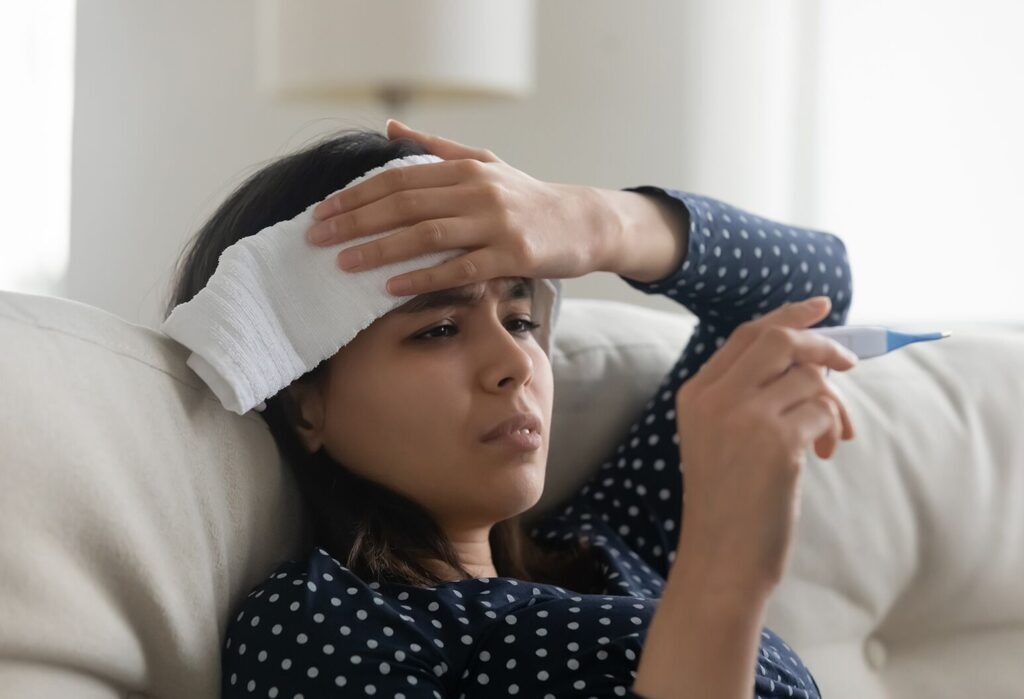
What is Viral Fever?
(H1 – Focus Keyword: Viral Fever)
Viral fever is a common term used to describe a group of viral infections characterized by an increase in body temperature. It is not a disease in itself but a symptom of an underlying viral infection. People of all ages can suffer from viral fever, and it is especially prevalent during monsoon and seasonal changes when viruses thrive.
Unlike bacterial infections, viral fever does not typically respond to antibiotics and usually resolves on its own with supportive care. However, in some cases, it can lead to serious complications if not managed properly.
What Causes Viral Fever?
(H2 – Focus Keyword: Causes of Viral Fever)
Viral fever is caused by various viruses that invade the body through inhalation, contact with infected individuals, contaminated surfaces, or insect bites. These viruses multiply in the body and trigger the immune system, resulting in fever and other symptoms.
Common viruses that cause viral fever include:
(H3 – Keyword: Common viruses causing viral fever)
- Influenza virus (Flu)
- Dengue virus
- Chikungunya virus
- Adenovirus
- Rhinovirus (common cold)
- COVID-19 virus (SARS-CoV-2)
- Enterovirus
- Respiratory syncytial virus (RSV)
Symptoms of Viral Fever
(H2 – Focus Keyword: Symptoms of Viral Fever)
Viral fever symptoms may vary depending on the virus and the individual’s immunity but generally include:
Most common symptoms:
(H3 – Keyword-rich subheading)
- High-grade fever (100°F – 104°F)
- Headache
- Muscle and joint pain
- Fatigue and weakness
- Sore throat
- Runny nose or nasal congestion
- Cough
- Skin rash (in dengue or chikungunya)
- Chills and sweating
- Loss of appetite
- Red eyes
Note: In children, irritability and lethargy are also common symptoms.
How is Viral Fever Diagnosed?
(H2 – Focus Keyword: Diagnosis of Viral Fever)
Since viral fever shares symptoms with many other infections, an accurate diagnosis is important to rule out bacterial, parasitic, or other underlying causes.
Steps involved in diagnosis include:
(H3 – Diagnostic Methods for Viral Fever)
- Medical History: The doctor may ask about symptoms, duration, travel history, recent insect bites, or exposure to sick individuals.
- Physical Examination: Vital signs, temperature, throat check, and skin observation help in clinical evaluation.
- Blood Tests: Complete blood count (CBC), Dengue NS1 antigen, Widal test, or PCR tests may be advised to confirm the virus.
- Rapid Antigen Tests (RAT): For infections like COVID-19 or Influenza.
- Chest X-ray: If respiratory complications are suspected.
Treatment for Viral Fever
(H2 – Focus Keyword: Treatment of Viral Fever)
There is no specific cure for viral fever, but symptomatic treatment helps reduce discomfort and accelerates recovery. Unlike bacterial infections, antibiotics are not effective against viral fever unless there’s a secondary bacterial infection.
Home-based treatment and remedies:
(H3 – Viral Fever Home Treatment)
- Hydration: Drink plenty of fluids – water, ORS, soups, herbal teas.
- Rest: Give your body adequate rest to boost immunity.
- Fever control: Use paracetamol (acetaminophen) for fever and body pain.
- Cool compress: Apply a wet cloth on the forehead to reduce temperature.
- Light diet: Easily digestible foods like khichdi, porridge, fruits.
Medications under medical guidance:
- Paracetamol or ibuprofen (for fever and pain)
- Antihistamines (for runny nose and sneezing)
- Cough syrups (if there’s dry or productive cough)
⚠️ Consult a doctor immediately if fever lasts more than 3 days, symptoms worsen, or rashes appear.
When to See a Doctor?
(H2 – Focus Keyword: When to consult a doctor for viral fever)
Seek immediate medical attention if you experience:
- Fever >104°F
- Continuous vomiting or diarrhea
- Difficulty breathing
- Chest pain
- Dehydration signs (dry mouth, dark urine, dizziness)
- Confusion or unconsciousness
- Rashes or bleeding gums (in dengue/chikungunya)
Prevention of Viral Fever
(H2 – Focus Keyword: Prevention of Viral Fever)
Preventing viral fever is often more effective than curing it. Here’s how you can reduce the risk:
Tips to prevent viral fever:
(H3 – Viral Fever Prevention Tips)
- Personal hygiene: Wash hands frequently with soap.
- Avoid close contact: Stay away from infected individuals.
- Use mosquito repellents: Especially during dengue/chikungunya season.
- Disinfect surfaces: Clean commonly touched areas like doorknobs and phones.
- Wear masks: Especially in crowded or polluted environments.
- Stay vaccinated: Take flu and COVID-19 vaccines as advised.
Difference Between Viral and Bacterial Fever
(H2 – Viral vs Bacterial Fever)
| Aspect | Viral Fever | Bacterial Fever |
| Cause | Viruses | Bacteria |
| Onset | Gradual | Often sudden |
| Duration | 3–7 days (self-limiting) | May worsen without antibiotics |
| Symptoms | Body aches, chills, fatigue | High fever, pus formation, localized pain |
| Treatment | Symptomatic (no antibiotics) | Requires antibiotics |
Is Viral Fever Contagious?
(H2 – Focus Keyword: Is viral fever contagious?)
Yes, most viral fevers are highly contagious and can spread via:
- Airborne droplets (sneezing, coughing)
- Direct contact with infected individuals
- Contaminated objects
- Insect vectors (like mosquitoes in dengue)
Isolation, hygiene, and proper sanitation are vital to prevent community spread.
FAQs on Viral Fever
(H2 – Focus Keyword: Viral Fever FAQs)
1. Can I treat viral fever at home?
Yes, mild cases can be managed at home with rest, fluids, and fever-reducing medication.
2. How many days does viral fever last?
Typically, viral fever lasts 3 to 7 days depending on the virus and immunity.
3. Can viral fever come back after recovery?
Usually no, unless there’s a new viral exposure. But low immunity can cause relapses or secondary infections.
4. What should I eat during viral fever?
Eat light and nutritious foods like fruits, boiled vegetables, soups, dal-rice, khichdi, and herbal teas.
5. Should I take antibiotics for viral fever?
No. Antibiotics do not work against viruses and should only be taken if prescribed by a doctor.
Final Thoughts: Take Viral Fever Seriously but Don’t Panic
(H2 – Focus Keyword: Viral Fever Treatment and Recovery)
Viral fever is common but often underestimated. With proper care, most people recover without complications. However, persistent high fever or worsening symptoms must be evaluated by a medical professional. Early diagnosis and treatment prevent complications like dehydration, respiratory issues, or hemorrhagic fevers like dengue.
Stay safe, maintain hygiene, eat healthy, and stay hydrated – that’s your best shield against viral infections.
Need Medical Help? Visit Your Nearest Clinic or Book an Online Consultation
(H4 – Call to Action)
Don’t ignore prolonged or severe fever. Get expert guidance from certified doctors near you. Book appointments or online consultations today to stay safe and protected.



